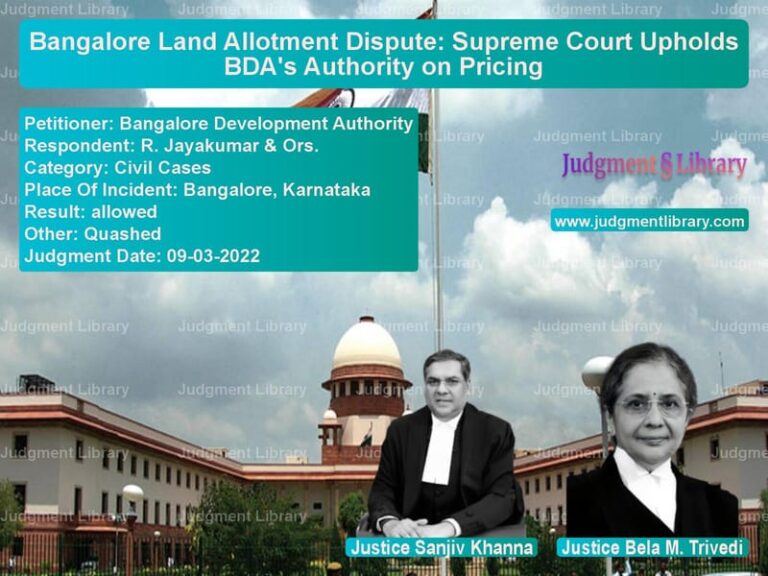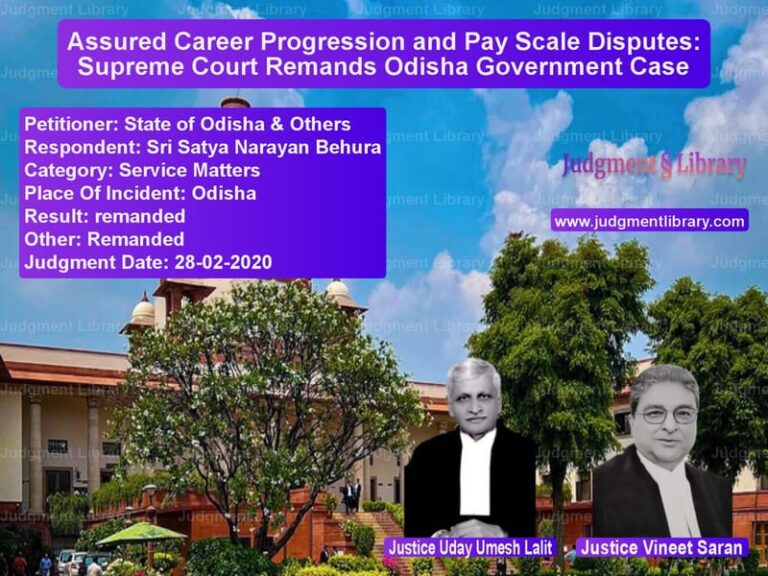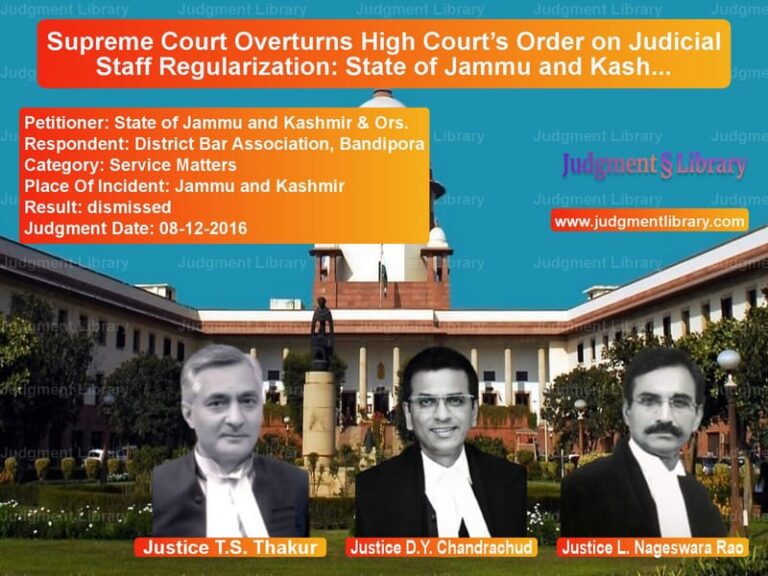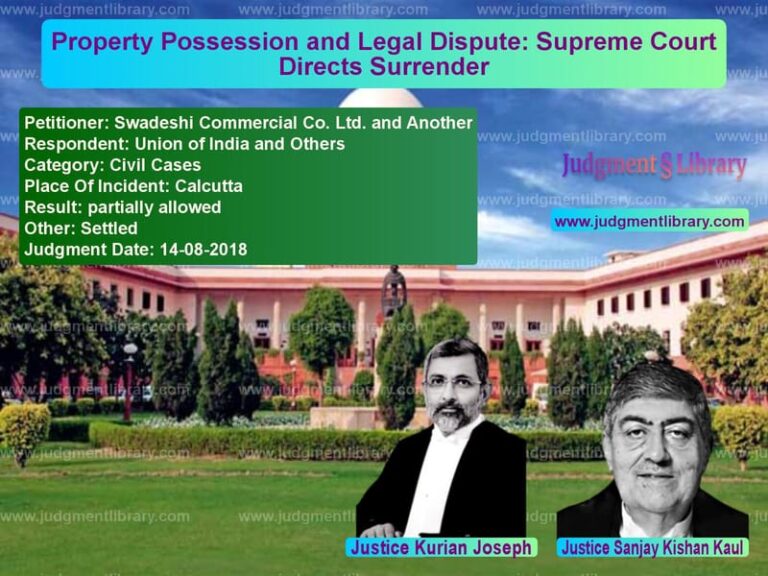Murder Conviction Overturned: Supreme Court Acquits Accused Due to Lack of Evidence
The Supreme Court of India, in Sudhakar @ Sudharasan v. State Represented by the Inspector of Police, set aside the conviction of an accused charged under Section 302 of the Indian Penal Code (IPC). The case revolved around allegations that the accused murdered his grandmother for money, but the Court found the prosecution’s case riddled with inconsistencies and unreliable witness testimonies.
Background of the Case
The case originated in Trichy, Tamil Nadu, where the accused, Sudhakar @ Sudharasan, was charged with murdering his grandmother, Mariyayee, by strangulation on January 17, 2013. The prosecution claimed that the accused, a habitual drunkard, frequently quarreled with the deceased over money and had a history of demanding financial assistance from her.
The prosecution alleged that on the evening of the incident, the accused strangled his grandmother and stole her money bag. The key eyewitness was Jayaraj (PW1), the son-in-law of the deceased, who claimed to have witnessed the accused committing the crime.
Legal Proceedings
- The trial court convicted the accused under Section 302 IPC and sentenced him to life imprisonment along with a fine of Rs. 1,000.
- The Madras High Court, in its judgment dated January 23, 2015, upheld the conviction and dismissed the appeal.
- The accused then filed an appeal before the Supreme Court.
Legal Issues Before the Supreme Court
- Whether the prosecution proved the case beyond a reasonable doubt.
- Whether the testimony of interested witnesses could be solely relied upon.
- Whether the defense of alibi raised by the accused was improperly ignored.
Arguments of the Parties
Petitioner’s (Sudhakar @ Sudharasan’s) Arguments
- The prosecution relied on testimonies of interested witnesses (PW1 and PW5), who had a property dispute with the accused.
- PW1 and PW5 gave contradictory statements, reducing their credibility.
- Independent witnesses (PW2, PW3, and PW4) turned hostile and did not support the prosecution’s version.
- The postmortem report indicated chest injuries inconsistent with strangulation.
- The accused had an alibi, as he was picked up from his mother-in-law’s house and not near the crime scene.
Respondent’s (State’s) Arguments
- The accused had a history of demanding money from the deceased and had a motive for murder.
- PW1, the prime eyewitness, saw the accused strangling the deceased.
- The money bag recovered from the accused proved his involvement.
- The inconsistencies in the witness statements were minor and did not affect the overall case.
Supreme Court’s Analysis and Judgment
The Supreme Court bench, comprising Justice N.V. Ramana and Justice S. Abdul Nazeer, examined the case critically and identified multiple flaws in the prosecution’s evidence.
1. Witness Credibility and Contradictions
The Court noted that the prosecution’s case was primarily based on the testimony of PW1 and PW5, who were related to the deceased and had an ongoing property dispute with the accused. The Court ruled:
“The evidence of an interested witness does not suffer from any infirmity as such, but it must be scrutinized with care. In this case, the contradictions and exaggerations in the testimonies create serious doubts about their reliability.”
2. Failure to Prove Motive
The Court held that while the prosecution alleged that the accused frequently quarreled with the deceased for money, no independent evidence supported this claim. It observed:
“There is no concrete proof to establish that the accused had a motive to commit the murder on the particular day.”
3. Inconsistencies in Medical Evidence
The postmortem report indicated injuries inconsistent with strangulation, suggesting that the deceased may have suffered a fall. The Court noted:
“The presence of fractured ribs and sternum casts doubt on the prosecution’s version that the deceased was strangulated.”
4. Hostile Independent Witnesses
The Court highlighted that independent witnesses (PW2, PW3, and PW4) did not support the prosecution’s version. This significantly weakened the case.
5. Defense of Alibi
The Court found that the accused’s alibi was improperly dismissed by the lower courts. The accused had presented a witness who testified that he was at another location at the time of the crime.
Final Judgment
The Supreme Court ruled in favor of the accused and issued the following directives:
- The conviction and sentence imposed by the trial court and affirmed by the High Court were set aside.
- The accused was ordered to be released immediately, unless required in any other case.
- The case was declared a miscarriage of justice due to unreliable evidence.
Impact of the Judgment
This ruling has significant implications for criminal law in India:
- Emphasis on Independent Evidence: Courts must ensure that convictions are not solely based on testimonies of interested witnesses.
- Stronger Scrutiny of Medical Reports: Forensic evidence should align with the prosecution’s claims.
- Protection Against False Implication: The judgment reinforces safeguards against wrongful convictions based on personal enmity.
Conclusion
The Supreme Court’s ruling in Sudhakar @ Sudharasan v. State Represented by the Inspector of Police is a landmark judgment emphasizing fair trial principles. By setting aside the conviction due to unreliable evidence, the Court reaffirmed the importance of proving guilt beyond reasonable doubt.
Petitioner Name: Sudhakar @ SudharasanRespondent Name: State Represented by the Inspector of Police, Srirangam Police Station, Trichy, Tamil NaduJudgment By: Justice N.V. Ramana, Justice S. Abdul NazeerPlace Of Incident: Trichy, Tamil NaduJudgment Date: 12-03-2018
Don’t miss out on the full details! Download the complete judgment in PDF format below and gain valuable insights instantly!
Download Judgment: Sudhakar @ Sudharasa vs State Represented by Supreme Court of India Judgment Dated 12-03-2018.pdf
Direct Downlaod Judgment: Direct downlaod this Judgment
See all petitions in Murder Cases
See all petitions in Bail and Anticipatory Bail
See all petitions in Legal Malpractice
See all petitions in Judgment by N.V. Ramana
See all petitions in Judgment by S. Abdul Nazeer
See all petitions in allowed
See all petitions in Quashed
See all petitions in supreme court of India judgments March 2018
See all petitions in 2018 judgments
See all posts in Criminal Cases Category
See all allowed petitions in Criminal Cases Category
See all Dismissed petitions in Criminal Cases Category
See all partially allowed petitions in Criminal Cases Category







